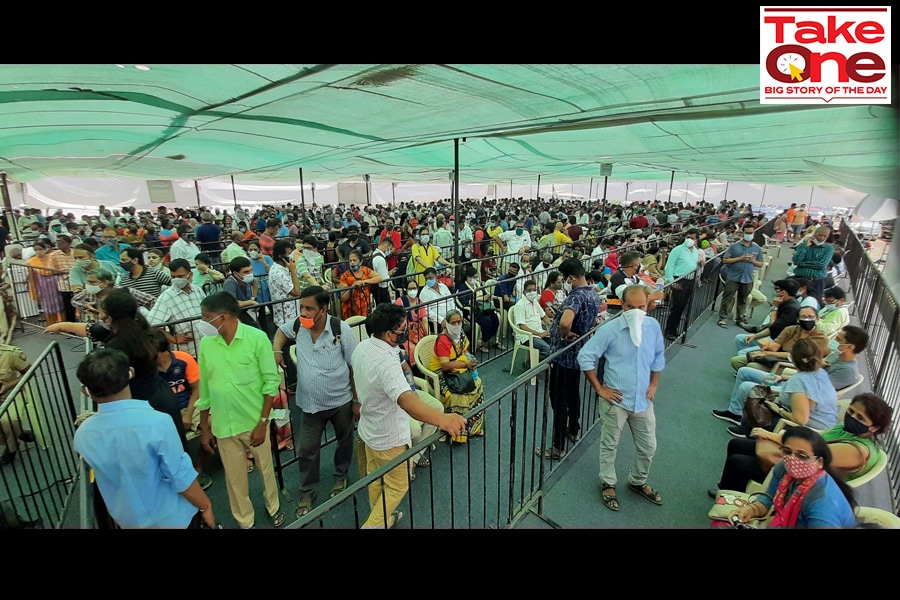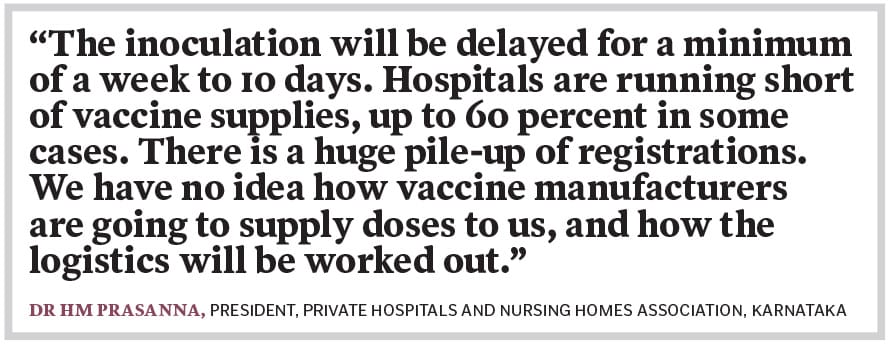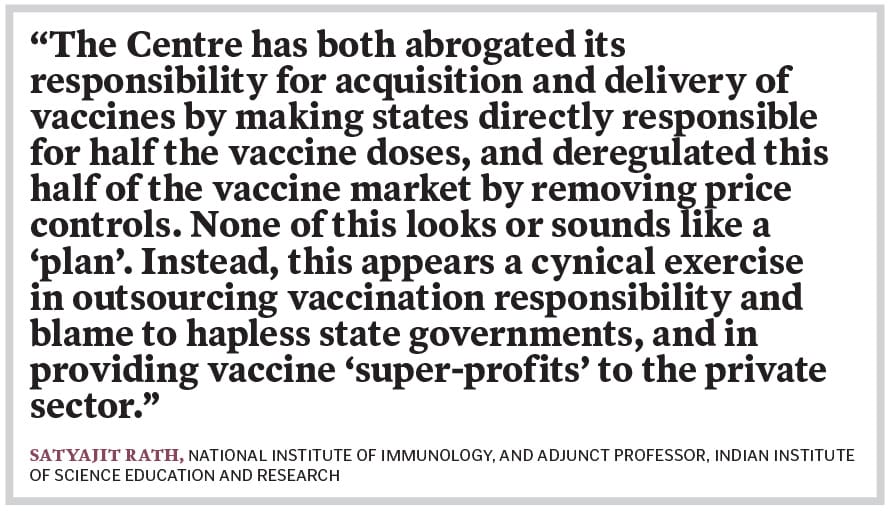Why the youth's May 1 date with a vaccine may prove to be a damp squib
States have struck deals with companies to procure doses but with no clarity on supply chain and delivery, inoculations likely to be delayed by at least a week to 10 days


 Huge crowd for vaccination at BKC vaccination centre a day after the jumbo centre ran out of vaccine stock
Huge crowd for vaccination at BKC vaccination centre a day after the jumbo centre ran out of vaccine stock
India’s ambitious roll-out of vaccines for its young is in some serious jeopardy.
And, in all likelihood, will miss its deadline. From May 1, some 60 percent of the population will be eligible for vaccinations, according to a plan announced by the Narendra Modi-led government on April 19. While that had been a deviation from the original plan, the need was amplified amidst one of the worst outbreaks of Covid-19 anywhere in the world, even as vaccine supplies were hit hard.
India is currently the second worst affected Covid-19 country in the world, and over the past few weeks has recorded the highest cases in a day by any country. On April 30, a day before India plans to roll out vaccines for all, daily cases in the country surged to 3.86 lakh with nearly 4,000 deaths in a day.
“Don’t queue up for vaccines tomorrow," Delhi chief minister Arvind Kejriwal pleaded on April 30. “As soon as vaccines arrive we will let you know, then you can come for shots. We appeal to you not to crowd vaccine centres in the next few days." Delhi is currently amongst the worst affected states in India, where daily cases have spiked in the past few weeks, and hospital beds and oxygen have become unavailable even as crematoriums work non-stop.
“Many across the country have registered for vaccines but we have not received stocks," Kejriwal said. “We are in regular touch with companies and we hope to get the vaccines in a day or two."
Delhi isn’t the only state which has suggested a shift in its vaccination plan for the young. Many others, including Maharashtra, Kerala, Karnataka, Madhya Pradesh and Gujarat, among others, have already said that the inoculation drives will not start from May 1. “Vaccination for 18-44 ages cannot begin on May 1," Rajesh Tope, the health minister for Maharashtra, said on April 29. “We need at least 20 lakh doses, only then vaccination can be started."
On April 19, as part of its new vaccine policy, the Centre devolved responsibility to the states and the private sector under a “liberalised and accelerated" Phase 3 strategy. This is a departure from the initial plan to vaccinate close to 30 crore health care and frontline workers starting January 16, before opening out the vaccine priority-wise, in phases, to senior citizens, persons with co-morbidities and then people above 45 years of age.
The Centre has now directed states and private hospitals to procure fresh doses directly from vaccine manufacturers for people above 18 years of age, and reserve existing doses, which have been supplied by the Centre, for the priority groups. Under the new policy, vaccine manufacturers would supply 50 percent of their doses to the central government, and the remaining 50 percent to state governments and in the open market.

While the Narendra Modi government believes this mass adult vaccination programme will augment vaccine availability by incentivising manufacturers, India has been struggling with a severe shortage of vaccines since the past few weeks. On April 28 when the government opened registrations for vaccinations, some 1.32 crore people logged on to register for vaccines on the government-owned Co-Win website, only to realise that none of them could schedule an appointment.
“We are talking about vaccinating a mammoth number of the population," Nandakumar Jairam, chairman and group medical director at Columbia Asia Hospitals told Forbes India. “The situation could have been dealt with better. There is definitely no definite answer to how soon we can vaccinate people, but I would expect a delay of between a week and ten days for the supplies to become stable. Vaccinations will start with limited doses, which can then be expanded after a few days."
A handful of private hospitals that have received vaccines through direct procurement from manufacturers will start inoculations for people above 18 years of age who have registered. Apollo Hospitals, India"s largest chain, said on April 30 that they will launch the vaccination programme with "limited quantities" of doses in their centres, which will be "ramped up in the weeks ahead". Shobana Kamineni, executive vice chairperson of Apollo Hospitals Group, said in a statement that the second wave of Covid-19 infections has seen younger patients getting affected, and "vaccinating everyone above the age of 18 will help in stopping the relentless rise in Covid cases and bring a Covid-free future closer to reality".
The phase-3 inoculation of all adults comes at a time when Covid-19 caseloads are high and the pace of vaccination has remained slow. Vaccinations in the country had peaked at 4.5 million doses on April 5 but have since averaged at about 3 million a day. On April 29, the number was just 1.9 million doses. Across cities, towns and villages, the coronavirus has also exposed the weakness of the public health infrastructure, with hospital beds, oxygen supply, ventilators and treatment drugs running in short supply. Even as questions continue around inadequate testing and underreporting of deaths, the Covid caseload is only expected to further swell in the days to come.
So far, India has vaccinated close to 151 million people, out of which 125 million have received the first shot and about 26 million have received both doses. About 90 percent vaccinations in the country have been done with Covishield, manufactured by the Pune-based Serum Institute of India (SII), and the rest with Covaxin, developed by Bharat Biotech in Hyderabad. Since the plan to open up vaccination was made, state governments have been in discussions with the companies to strike up deals to ensure a steady supply of the vaccines.
SII has announced that it will sell Covishield for Rs300 per dose to states and at Rs600 per dose to private hospitals while Bharat Biotech has pegged prices at Rs400 per dose for state governments and Rs1,200 for private hospitals. SII had earlier announced a price of Rs400 per dose for state governments, before reducing it by Rs100 earlier this week. Bharat Biotech too had initially pegged the cost for state governments at Rs600 per dose. So far, both companies have been selling their vaccines to the Centre for Rs150 per dose.
Delhi, for instance, has struck a deal to procure 1.34 crore vaccines, 67 lakh doses each from Serum Institute of India and Bharat Biotech. “Kerala will purchase 1 crore doses of Covid-19 vaccines from the open market," Kerala chief minister Pinarayi Vijayan said on April 28. This includes 70 lakh doses of Covishield and 30 lakh doses of Covaxin, over the next few months. The government pegged the cost of vaccinations at Rs 483 crore for the 1 crore vaccines, bringing the average procurement price to Rs 483 per dose. Most states in the country have also announced that they will provide vaccines for free.
A third vaccine candidate that has received the regulator’s authorisation for emergency use in India is Russian vaccine Sputnik V, the first batch of which is expected to be delivered on May 1. Dr Reddy’s Laboratories, which owns the exclusive marketing and distribution rights to sell Sputnik V in India, has not yet announced a price for the vaccine, but it is expected to cost less than $10 (Rs750).
Why are States in a Fix?
Much of the rush to begin vaccinations is to bring some reprieve from the escalating situation.
Many statistical projections predict India’s caseload to peak only in May, which could put additional pressure on state governments. Much of that is also largely due to the government ignoring clear signs of a potential second wave, and giving permissions to large gatherings in the country. In addition, the country has also seen mutations of the virus, which is now fast spreading in regions across the country.

“The two major variants that India is seeing during its Covid-19 second wave, the B.1.617, the double mutant, and B.1.618, the triple mutant, are infecting people at a much higher pace," Dr Arvind Lal, chairman and managing director of Dr Lal Path Labs, told Forbes India on April 30. “Aerosols from infected people are likely staying in the air longer in areas and infecting others."
“We have not received enough doses to even vaccinate all the people above 45 years of age. Many people are registering, but there are no slots available. We are turning away those who come to the vaccination centres," says a senior doctor working with the Tamil Nadu state government, who did not want to be identified.
“Since March, we are battling a situation of shortage and uncertainty. Many a times, vaccines reach primary health care centres only 30 minutes before inoculation time and people are called to come down for their dose at a short notice. This is leading to delays and many people missing out on their vaccinations," the doctor says. J Radhakrishnan, additional chief secretary (health) told the media on April 30 that Tamil Nadu chief minister Edappadi K Palaniswami had ordered for 1.5 crore vaccines, but “we don’t know when it will reach and whether it will reach by tomorrow [May 1]".
While the Rajasthan government has placed an order of 12.5 crore doses of Covishield from the Serum Institute, the state has pushed the inoculation by 15 days. Even Goa, which has placed an order of five lakh doses with the Serum Institute of India for the Covishield vaccine, is anticipating a wait of several days. Telangana’s Health Minister Etela Rajender has also confirmed that vaccinations in the state will not start on May 1, as there is a requirement of 3.6 crore doses to vaccinate close to 1.8 crore people between the ages 18 and 45 in the state. Telangana, which is in talks to procure Covaxin and Sputnik V vaccines as per media reports, expects the Centre to step in. Uttar Pradesh, India"s most populous state, has also placed an order for one crore vaccines with SII and Bharat Biotech, but has not received them yet. The current stock in the state, according to "‹UP health minister Jai Pratap Singh, is only sufficient to provide doses to the population above 45 years of age
Karnataka Health Minister Dr K Sudhakar has also confirmed that while people in the 18-45 age category can register on the Co-Win portal, they have to wait for the government to intimate them about the availability of doses. He added that the government--which has so far administered 93.5 lakh doses, according to Chief Minister BS Yediyurappa--has placed an order with SII for 1 crore doses"‹
“The inoculation will be delayed for a minimum of a week to 10 days. Hospitals are running short of vaccine supplies, up to 60 percent in some cases. There is a huge pile-up of registrations," Dr HM Prasanna, president of the Private Hospitals and Nursing Homes Association in Karnataka, tells Forbes India. “We have no idea how vaccine manufacturers are going to supply doses to us, and how the logistics will be worked out."
Adit Vora, a doctor who runs the Life Care Institute of Medical Sciences and Research in Ahmedabad, tells Forbes India that is still awaiting a briefing from the Ahmedabad Municipal Corporation (AMC) about the further course of action with respect to vaccination. “The vaccines we’ve got now are not sufficient. There will be a delay [beyond May 1] because the [Gujarat state] government has decided to administer vaccines only in government hospitals for now," he says.
Why the Mess?
Experts believe that rather than fulfilling its original target of priority vaccination of health care professionals, frontline workers, senior citizens and persons above 45 years with co-morbidities, the state has thrown open vaccination to all adults without any plan regarding actual delivery.
“It [Centre] has both abrogated its responsibility for acquisition and delivery of vaccines by making states directly responsible for half the vaccine doses," says Satyajit Rath, a scientist at the National Institute of Immunology and adjunct professor at the Indian Institute of Science Education and Research. “And finally, it has deregulated this half of the vaccine market by removing price controls. None of this looks or sounds like a ‘plan’. Instead, this appears a cynical exercise in outsourcing vaccination responsibility and blame to hapless state governments, and in providing vaccine ‘super-profits’ (to use Adar Poonawala’s phrase) to the private sector."
For the private sector, catering to vaccine demand is subject to roll-out plans and supply processes of manufacturers, many of which will evolve only over the next several weeks, Dilip Jose, managing director and CEO of Manipal Hospitals, told Forbes India on April 27. “Currently, we are awaiting clarity on the supply process, including the quantities and calendarisaton of the vaccine allocation for private hospitals, which would enable us to in turn commit a schedule to our customers. We would hope that this would get sorted out soon," he says.
Experts, who have been flagging concerns around how the high price points of the vaccines are likely to lead to inequities in access to vaccines, say that the Centre needs to step up to take responsibility in ensuring vaccines are made available to everyone. “Currently, all the Union government can do is to take responsibility for vaccine supply, work for a steady improvement in the supply chain by approving more and more vaccines with good, proactive regulatory practices, helping to enhance vaccine manufacturing capacities, and providing technical help to states in implementing their own specific [free] public vaccination campaigns under constantly changing conditions," says Rath.
Meanwhile, even as the state governments await clarity on their vaccine supplies, the wait for private hospitals could also take longer than expected. On April 29, Dr Aqsa Shaikh, an associate professor at Hamdard Institute of Medical Sciences & Research, had said that the Serum Institute of India had informed her that a request for vaccines to private hospitals could take another five or six months.
“Due to our current obligation to meet the government"s existing requirements and to meet the additional demands emanating from state governments under liberated and accelerated vaccination, it is challenging to meet independently the requirements across from large numbers of private hospitals," an email from Serum Institute of India, written to Shaikh said. “Therefore, we urge you to access the private market supply chain channels, which will take about 5-6 months from now. In the meantime, it is suggested to approach the state government for vaccine supplies which was provided earlier for the category of citizens over 45 years of age." Shaikh had posted a screenshot of the email on Twitter.
Across other hospitals too, many are still working out the modalities of the deal. “While we may have specific preference for some of the corporate customers and could try and plan on that basis, we would also hope to be able to cater vaccines to the ask of a choice, if indeed that is feasible," Jose of Manipal Hospital had told Forbes India earlier. “However, all this would be subject to the roll-out plans and supply processes of manufacturers, much of which would only evolve over the next several weeks."
Clearly, the May 1 plan looks out of place, for now.
First Published: Apr 30, 2021, 18:46
Subscribe Now